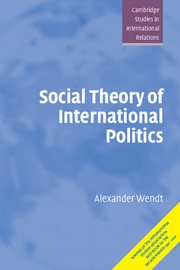Book contents
- Frontmatter
- Contents
- Acknowledgements
- Dedication
- 1 Four sociologies of international politics
- Part I Social theory
- Part II International politics
- 5 The state and the problem of corporate agency
- 6 Three cultures of anarchy
- 7 Process and structural change
- 8 Conclusion
- Bibliography
- Index
- Miscellaneous Endmatter
5 - The state and the problem of corporate agency
Published online by Cambridge University Press: 05 September 2012
- Frontmatter
- Contents
- Acknowledgements
- Dedication
- 1 Four sociologies of international politics
- Part I Social theory
- Part II International politics
- 5 The state and the problem of corporate agency
- 6 Three cultures of anarchy
- 7 Process and structural change
- 8 Conclusion
- Bibliography
- Index
- Miscellaneous Endmatter
Summary
In part I I described a constructivist ontology of social life. Against materialism constructivism hypothesizes that the structures of human association are primarily cultural rather than material phenomena, and against rationalism that these structures not only regulate behavior but construct identities and interests. In this ontology material forces still matter and people are still intentional actors, but the meaning of the former and the content of the latter depend largely on the shared ideas in which they are embedded, and as such culture is a condition of possibility for power and interest explanations. Analysis should therefore begin with culture and then move to power and interest, rather than only invoke culture to clean up what they leave unexplained.
Constructivism is not a theory of international politics. Like rational choice theory it is substantively open-ended and applicable to any social form – capitalism, families, states, etc. – so to say anything concrete we have to specify which actors (units of analysis) and structures (levels) we are interested in. The discipline of International Relations imposes some broad limits on these choices, and within IR this book is concerned with states and the states system. States are key actors in the regulation of organized violence, which is one of the basic problems of international politics, and the structure of the states system is relatively autonomous from other structures of the modern international system, like the world economy, which enables us to study it at least partly on its own terms.
- Type
- Chapter
- Information
- Social Theory of International Politics , pp. 193 - 245Publisher: Cambridge University PressPrint publication year: 1999



